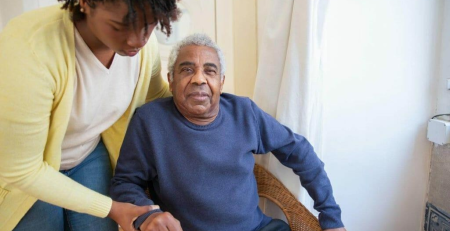How to be Empathetic as a Caregiver

Humans are moved more by the genuine kindness and understanding of people than what they say. This is the reason why empathetic people tend to connect to people more than those who lack empathy. Humans love to be cared for or to be around people who care for their well-being. When you are empathetic as a person, you easily connect to people and get them to work with you more easily than when you lack empathy. Empathy is a very vital characteristic needed in caregiving as caregivers interact and work with their patients.
Notwithstanding the importance of empathy in caregiving and its importance in human interaction, some people do not know the true meaning of empathy. The term must be clearly defined and made clear.

What is Empathy?
Empathy is the ability of a human to emotionally connect to another human through several levels and processes. This emotional connection usually involves the feeling of closeness, relatedness, and sympathy. At times, empathy goes beyond mere sympathy, and it comes up to the level of the feeling of closeness and relatedness.

Empathy is also the act of connecting to the feelings of another person. It does not only involve recognizing someone else’s emotions but also experiencing them deeply. Thus, the highest form of empathy is when you can connect to and recognize someone’s feelings by sharing their feelings.
There are different types and levels of empathy.
Types of Empathy
1. Affective Empathy
Affective empathy is when a person actively shares another person’s emotions, fear, sadness, and joy. This is the highest level of empathy as it has been stated earlier in this article. This is the best form of empathy to deploy in the field of caregiving as by sharing your client’s emotion, you deliver the services expected of you efficiently.
2. Somatic Empathy
Somatic empathy deals with feeling the physical pain and discomfort of another person. When a person is not physically alright, a person who has somatic empathy can understand the discomfort of the person affected and tackle it. This type of empathy is good to have for caregivers.
3. Cognitive Empathy
Cognitive empathy involves situations whereby certain people understand other people’s perspectives and mental states. Caregivers with cognitive empathy can put themselves in their client’s shoes, recognizing their thoughts, beliefs, and intentions.
Next, how can a caregiver become empathetic enough to render efficient services a client needs?
How to be Empathetic as a Caregiver

1. Active Listener
The first step to being an empathetic caregiver is that you need to be an active listener. You have to speak less and listen more when you are with your client. You need to pay attention totally to them—their words, tone, mood, and even body language.
2. Connect Emotionally
You need to connect emotionally to your clients to be an efficient caregiver. You need to feel their emotion, pain, joy, and sorrow, and you’ve to take an active part in the way they express their emotions. You have to acknowledge that their feelings are valid, and you understand, at all times.
3. Exude Compassion
There is a need for absolute compassion in the field of caregiving. You’ve to be compassionate towards your clients and show them you understand and you’re concerned. This will make your client feel they are in safe hands, and that they can be free around you. You need to pet them and assuage their fears.
4. High-level of Understanding
Some clients might not be as sweet as you want, and can annoy you at times; this is when you deploy the value of a high level of understanding as you deal with them. No matter the level of annoyance a client must have pushed you to, you need to act reasonably and understand that such cases are inevitable. This high level of understanding ensures you cope with your client’s weaknesses and lowest points.
5. Being Flexible
A good caregiver has to be flexible in his or her beliefs and worldview as he or she deals with clients. In fact, as a caregiver, you need to connect deeply and understand your client’s beliefs and worldview. Being an empathetic caregiver, you need to ensure that you do not misunderstand or abuse the worldview of your client.

Conclusion
A good caregiver needs to be empathetic. There cannot be an efficient caregiving process when there is no empathy. Therefore, empathy is vital in the provision of an efficient caregiving process. As a caregiver, you need to understand what empathy is, the types of empathy, and how you can deploy empathy for efficient use in the field. As a client, too, you need to know when a caregiver is empathetic and delivers good services to you.












